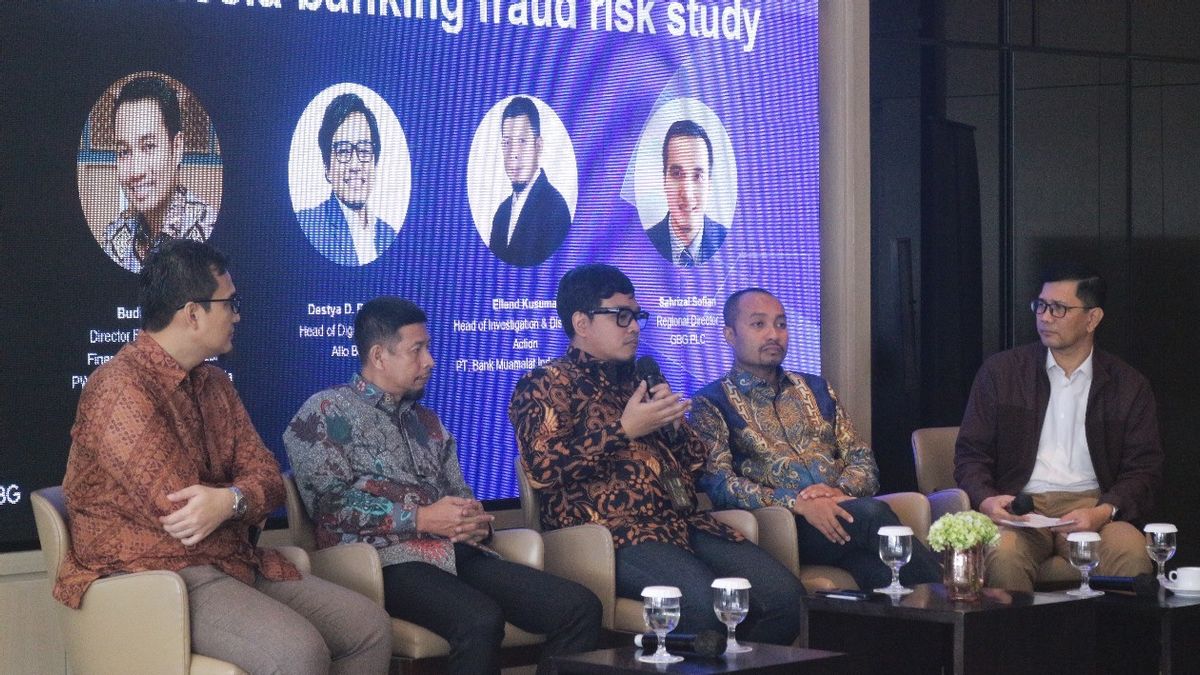JAKARTA - Along with the growing threat of fraud and financial crime cases targeting the banking sector very quickly due to digital advances, industry players must be able to respond comprehensively. This response needs to emphasize strong security measures, which include people, business and technology processes.
The latest survey conducted by GBG in collaboration with Chartis Risk revealed that Indonesia was ranked at the top in the case of money transfer (transfer fraud case) and identity theft, which was 67 percent.
Responding to these findings, GBG held a seminar "Building Trust in Digital Channels: Risk Study of Indonesian Banking Fraud" at the Pullman Thamrin Hotel, Jakarta, some time ago.
The event, which was attended by 88 participants from 30 banks and financial companies, presented important speakers including Sahrizal Sofian, Country Director of Indonesia GBG PLC, Destya D. Pradityo, Head of Digital Strategy at Allo Bank, Ellend Kusuma, Head of Investigation and Disciplinary Action at PT Bank Muamalat Indonesia Tbk, and Budi Santoso, Director of the Forensic & Financial Crime Unit PwC and Director of ACFE Indonesia. Here are important things taken from this intelligent event.
The GBG and Chartis Risk survey underlined that fraud cases continue to transform and develop. Indonesia has become the main target because of its growing digital product market and high financial inclusion rate, which is expected to reach 90 percent by 2024.
The fraudsters will increasingly target users who are more vulnerable to being victims than financial institutions. This shift has led to an increase in cases involving money mules and identity theft.
Budi Santoso emphasized that eradicating fraud cases requires coordinated efforts between regulatory technology providers (such as GBG), financial institutions, regulators, and law enforcement. Education and sustainable investment in advanced technologies, such as AI and machine learning, are essential for outsmarting various advanced fraud case techniques.
The various and high number of cases of fraud in Indonesia comes from ongoing digital transformation, easier access to financial services, and increasing user targeting by fraudsters.
Destya D. Pradityo discussed the importance of balancing security with user accessibility. Financial literacy must be accompanied by digital literacy through sustainable consumer education. Allo Bank focuses on disciplined prevention measures and in the early stages of building strong technology infrastructure to mitigate fraud cases.
Bank internal research shows that consumers prioritize security when transacting and storing data compared to user interface designs and features.
Ellend Kusuma emphasized the need for effective customer complaint handling procedures to investigate the causes of fraud cases and implement early prevention measures. A strong complaint management system can help identify patterns of fraud cases and ensure immediate intervention, thereby strengthening customer confidence.
Sahrizal Sofian emphasized the need to increase awareness of parties exploiting digital advances. GBG uses a layered scoring method with identity verification, transaction monitoring, behavioral analysis, and endpoint security (user device security). Collaboration between financial institutions is very important, and GBG plans to develop a platform for better and better coordinated information exchange.
Panelist also discussed the benefits and challenges of cloud adoption in the detection of fraud cases. Budi Santoso highlighted the importance of data readiness, budget considerations, and strict security measures, as well as compliance with regulatory regulations.
Destya D. Pradityo advised companies to partner with cloud providers registered in Indonesia and ensure internal readiness through IT staff training and infrastructure development (information technology). Sahrizal Sofian noted the potential of cloud technology in increasing the detection of fraud cases through real-time updates and faster response times.
Destya D. Pradityo explained that the prevention of effective fraud cases began with firm action during the registration and orientation process, followed by continuous investigation and validation. He also highlighted the need for continuous adaptation to the growing fraud case technique and the importance of human resources in the application of this technology.
Ellend Kusuma emphasized a comprehensive initial investigation, considering customer perspectives, and behavioral analysis to understand the root causes of fraud cases. Budi Santoso emphasized the need for investment in security technology and training programs to reduce the risk of social engineering attacks, which include 60 percent of fraud cases in Indonesia. He also added and advocated improvements to the periodic transaction monitoring system to stay up to date and effective.
Prioritizing consumer protection in a digital banking environment involves efforts to build trust through comprehensive education on data security. Ensuring consumers feel safe and understanding the importance of keeping their information is the most important thing.
Clear and simple communication about data security practices is critical to empowering customers with the necessary knowledge to protect themselves.
These measures collectively strengthen consumer confidence and increase financial institution resilience against the growing cyber threats.
Along with advances in technology, companies and financial institutions face a continuous need to transform and adapt quickly to combat the growing threat of fraud cases.
The main insight from this seminar emphasizes the need for identification of fraud cases early on and proactive steps, sustainable investment in technology to uphold performance and credibility, as well as prioritize education and technological readiness.
The application of efficient technology and collaboration between stakeholders is emphasized as an important strategy. In addition, social engineering and endpoint threats have an impact on almost half of institutions in Indonesia, highlighting the need for strong security measures.
The tactical nature of fraud cases that continue to develop emphasizes the importance of increasing financial and digital literacy, prioritizing cybersecurity investment, and providing extraordinary experiences to customers. This collective effort is very important in maintaining digital trust and financial service integrity in Indonesia and around the world.
The English, Chinese, Japanese, Arabic, and French versions are automatically generated by the AI. So there may still be inaccuracies in translating, please always see Indonesian as our main language. (system supported by DigitalSiber.id)













